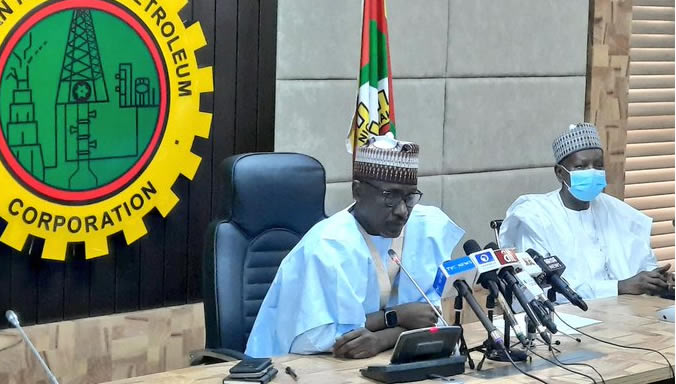
The Nigerian National Petroleum Company Limited announced on Thursday that it would hold the ground-breaking of three mini-Liquefied Natural Gas projects in August this year.
NNPC’s Group Chief Executive Officer, Mele Kyari, announced this in Abuja at the inaugural Africa Gas Innovation Summit 2024 organised by the Society of Petroleum Engineers, with the theme: “Igniting the Future: Driving Sustainability in Africa’s Energy Landscape through Gas Technology and Innovation.”
Kyari also said the company would take Final Investment Decision this year for the roll out of six additional Compressed Natural Gas mother stations, adding that scores of CNG refueling stations were currently being upgraded by the oil firm nationwide.
LNG and CNG are both cleaner-burning alternatives to traditional fuels like petrol and diesel. LNG is used in power plants to generate electricity, while industries use it as a fuel source for various processes requiring thermal. CNG is primarily used as a transportation fuel for buses, trucks, and some cars. It is also a useful fuel source for power generation.
Speaking at the summit, the NNPC helmsman, who was represented by the company’s Executive Vice President, Gas, Power and New Energy, Olalekan Ogunkeye, said NNPC has signed various agreements for the development of gas projects in line with the the Federal Government’s drive to deepen gas usage.
“In order to accelerate gas commercialisation, bearing in mind that this is the era of gas, NNPC has signed MoUs and project development agreements for floating LNG projects which will be the first in Nigeria, while currently executing a 30mmscuf/d small scale mini-LNG project.
“Indeed, we are currently participating in three mini-LNG projects slated for ground-breaking this August. NNPC is also currently leading the Federal Government’s autogas initiative.
“Aside from the recent inauguration of the 5.2mmscuf/d Ilasamaja mother station CNG plant, the GCEO of NNPC recently announced plans to take FID within this year and roll out additional six CNG mother station plants with similar capacity, and scores of CNG refilling stations are being renovated and upgraded to provide access to cleaner and cheaper fuel across the country,” Kyari stated.
Other initiatives, according to him, include the development of several gas based industries in industrial hubs at strategic locations nationwide, boasting fertiliser and chemical plants, among others,.
This, he said, are all in line with the Federal Government’s aspirations underpinned by the Decade of Gas programme.
Commenting on the energy landscape, Kyari said sub-Saharan Africa is still energy deficient despite contributing the lowest volume of emissions globally.
“Nigeria, however, is blessed with abundant natural gas resources of more than 209TCF of gas, which can take us out of these challenges by providing access to electricity, clean cooking fuel, autogas and feedstock for other industries, thereby generating wealth and improving our wellbeing.
“From an NNPC standpoint, this summit’s theme and topics clearly resonate, and NNPC is at the forefront of orchestrating a sustainable energy future for itself and Africa leveraging on gas technology and innovation,” he stated.
To underscore the critical roles of gas in economic development and to maintain energy security, he said NNPC had embarked on several gas infrastructure projects, some of which had already been inaugurated.
“Such as the second phase of the AHL gas processing plant, the 300mmscuf/d ANOH gas processing plant, and the ANOH gas pipeline project, all inaugurated by the President of Nigeria.
“NNPC is absolutely focused on leveraging on the nation’s gas assets to significantly generate value and opportunities for all Nigerians. This in deed is what Nigerians deserve,” the national oil firm’s boss stated.
Kyari also pointed out that technology and innovation were key buffers for growth and development and would assist in the drastic transformation of industries, adding that NNPC had developed its research institute as a result of this.
The Minister of State for Petroleum Resources (Gas), Ekperikpe Ekpo, who was represented by the Permanent Secretary of the ministry, Nicholas Ella, said Africa, with its abundant natural gas resources, stands at a pivotal juncture and Nigeria must play a leading role in that.
“We have the opportunity to leverage these resources not only to meet our energy needs but also to drive sustainable development. The transition to a sustainable energy future demands that we embrace innovative technologies and practices that minimise environmental impact while maximising efficiency and productivity.
“This entails investing in cutting-edge research, promoting the deployment of advanced gas technologies, and encouraging the adoption of best practices across the industry. Technological innovation lies at the heart of our endeavour.
“From exploration and production to transportation and utilisation, advancements in gas technology are revolutionising the sector. Innovations in Liquefied Natural Gas, CNG for vehicles, gas-to-power solutions, and carbon capture and storage are just a few examples of how technology is reshaping the landscape,” Ekpo stated.
On his part, the Chairman, Society of Petroleum Engineers, Nigeria Council, Salahuddeen Tahir, pointed out that the top challenges confronting Africa’s energy landscape include financing, technological and skills gap, high costs of oil and gas production, infrastructure challenges, global push for transition to cleaner energy as well as security issues.
To tackle these challenges, Tahir said, “There is no gainsaying that Africa needs to urgently innovate for the benefit of our industry, our respective economies and our citizenry.”
This came as the representative from the National Office of Hydrocarbons and Mines, Morocco, Amina Benkhadra, during her virtual presentation at the summit, titled, “Building Strategic Partnership,” stated that 13 countries within the territory of the $25bn Nigeria Morocco Gas Pipeline project would sign an Inter-Governmental Agreement for cross-border cooperation in this second quarter of 2024.









